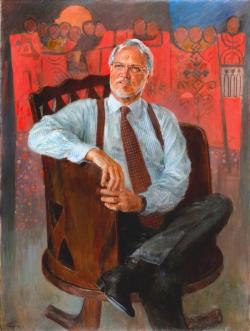Craig Calhoun is a comparative and historical sociologist, social theorist, and scholar, known for his interdisciplinary work in anthropology, communications, economics, history, international studies, political science, philosophy, and science and technology studies. His latest book, “Degenerations of Democracy,” co-authored with Charles Taylor and Dilip Gaonkar, was published by Harvard University Press in 2022. He edited “The Green New Deal and the Future of Work” with Benjamin Fong (Columbia University Press, 2022) and has collaborated with former students to create widely used anthologies covering classical and contemporary sociological theory. Calhoun has authored nine books and published over 150 peer-reviewed papers, articles, and chapters.
Calhoun currently serves as the University Professor of Social Sciences at Arizona State University. Prior to joining ASU, he served as president and director of the London School of Economics and Political Science (LSE), president of the Social Science Research Council (SSRC), and president of the Berggruen Institute. Calhoun has taught at Columbia University, NYU, where he founded the Institute for Public Knowledge, and the University of North Carolina at Chapel Hill, where he also served as dean of the graduate school and directed the University Center for International Studies. In addition, he has been a visiting professor at universities and institutes in the U.S. and abroad, including in Asmara, Beijing, Bristol, Khartoum, Oslo, and Paris, and as an Einstein Fellow in Berlin.
Calhoun's research focuses on contemporary transformations, possible futures, and the political economy of the modern world-system. He is also committed to studying universities and knowledge institutions, democracy, and shifting structures of social solidarity. In his philosophical pursuits, Calhoun explores the relationship between transformation and transcendence in understanding human existence.
Calhoun is actively engaged in advancing political, economic, and social democracy locally, nationally, and internationally. Calhoun serves on the board of the MasterCard Foundation, the American Assembly, the Center for Transcultural Studies, the Pulaski Institution, and Reset Dialogues. Calhoun is also active in speaking and supporting programs for a range of organizations and communities in Arizona, elsewhere in the US, and internationally.
Craig Calhoun is University Professor of Social Sciences at Arizona State University. He has worked most of his life to advance interdisciplinary social science and shape social transformations for the better.
Prior to coming to ASU, Calhoun served as Director and President of the London School of Economics and Political Science (LSE) where he remains Centennial Professor of Sociology, and President of the Berggruen Institute where he remains Senior Advisor, among other things overseeing the Berggruen Prize in Philosophy and Culture. He was previously President of the Social Science Research Council (SSRC), Dean of the Graduate School and Director of the University Center for International Studies at UNC-Chapel Hill, and founder and Director of the Institute for Public Knowledge at NYU. In addition to LSE, NYU, and UNC, he has been a professor at Columbia University and the University of Oslo and a visiting professor in Bristol, Paris, Berlin, Khartoum, Asmara, and Beijing.
Calhoun grew up mostly in Illinois, Indiana, Kentucky, and California, the son of a somewhat itinerant Protestant minister. He thinks an early need to understand different social settings shaped his vocation for social science. So did the 1960s and 70s. See (link to “My Back Pages”). He left high school early for the Resident Honors Program at USC, then did degrees at Columbia, Manchester, and Oxford Universities; studying anthropology, sociology, political philosophy, and modern social and economic history. He made his career primarily in sociology, but always within an interdisciplinary context.
As a social theorist and historical and comparative sociologist, Calhoun’s has studied democracy and social movements, the future of knowledge institutions, the shifting nature of capitalism and globalization, the future of place-based communities, the transformation of work and indeed of the human itself, and other social issues raised by new technologies, and the creativity, solidarity, and determination needed to achieve just and sustainable futures. He has done both historical and contemporary research in Britain, France, the US, China, and the Horn of Africa.
Calhoun’s newest book, Degenerations of Democracy (with Charles Taylor and Dilip Gaonkar) will be published by Harvard University Press in 2020. He is the author or co-author of 9 other books, editor of another 22, and has published more than 70 refereed journal articles and 100 book chapters that address culture, social movements, education, communication, religion, nationalism, the impact of technology, capitalism and globalization, critical theory and philosophy, and contemporary and historical empirical research. His work has been widely reprinted in anthologies and translated into 21 languages.
Calhoun has been elected a Fellow of the British Academy, the American Association for Advancement of Science, and the American Philosophical Society, a member of the Council on Foreign Relations, an Einstein Fellow by the City of Berlin and President of the International Institute of Sociology. He has received honorary doctorates from La Trobe University in Melbourne and the Erasmus University in Rotterdam, and been awarded the Sigillum Magnum of the University of Bologna.
He serves on the board of the Mastercard Foundation, one of the largest foundations in the world and dedicated to the future of Africa. He is also Chair of the Advisory Committee to Weatherhead Center for International Affairs at Harvard and Chair of the Board of the American Assembly at Columbia University. He holds honorary appointments as Centennial Professor at LSE and Professor at the College d’Études Mondiales of the Maison des Sciences de l’Homme in Paris.
At ASU, Calhoun holds concurrent appointments in the School of Politics and Global Studies, the Thunderbird School of Global Management, the Watts School of Public Affairs, the School for the Future of Innovation in Society, the School of Sustainability, and the School of Arts, Media and Engineering.



